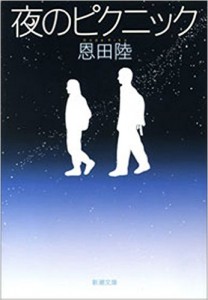Browsing through this list of 50 books that high school students should read from Shinchosha, I picked this book because I thought the cover looked interesting. It turned out to be about high school students walking for 24 hours straight as a school tradition at the end of each year. There are three years of high school in Japan, so they do it three times during their career. The story switches back and forth between the perspective of a half brother and sister who by a bad coincidence ended up in the same class for their last year in high school. They have never spoken to each other despite being in the same class, and they have kept it a secret from all of their friends.
I thought this book would be easy to read. Readers on goodreads read it straight through, and it took one reviewer 1.5 hours to read. However, for me it was quite difficult at first. There is a lot more description of thoughts and dialogue describing personality than I’m used to reading. Also, some of the vocabulary was less formal than what I typically read, even though there was no excessive slang or use of dialect.
I found myself adding a lot of words to my anki deck, which I use to try and retain vocabulary I think may be useful. This book was particularly rich in onomatopoeia, which is one of my weak points. It’s often easy to gloss over the nuance it adds because you can still pick up the main idea without knowing the onomatopoeia most of the time. Here is an example of some of the kinds of words that appeared frequently in yoru no pikunikku and the kind of things they describe:
- しょぼしょぼ – tired and squinting eyes
- ごそごそ – shuffling through a backpack
- ぜいぜい – out of breath
- ぞろぞろ – slow moving crowd
Many Japanese reviewers say the book is very nostalgic, which made me want to read it to understand the Japanese high school experience. I would recommend it for this purpose. One character, Anna, who lives in America and doesn’t make it to her 3rd and final year walk. Is torn between American and Japanese culture, and Onda uses her and her brother Junya, who identifies more as an American, to flesh out the contrast. It does a good job describing the culturally rooted appeal of the walk, which is baffling and somewhat intriguing from an American perspective. Junya comes all the way to Japan to observe the walk, but he doesn’t actually want to be a part of it.
The setting is a walk that consists of two back to back marathons, so there is a lot of description about fatigue and pain. You may expect the book to be pretty boring. Even though the walk is monotonous, the story keeps moving, and it is interesting to see how the drama plays out. It was challenging for me to read, but I think it was worth it for the insight and vocabulary. Someone more experienced than me in Japanese conversation may find it moves at a quick pace and find it to be quite relaxing when they get to put the book down and be grateful they don’t have to keep on walking.

